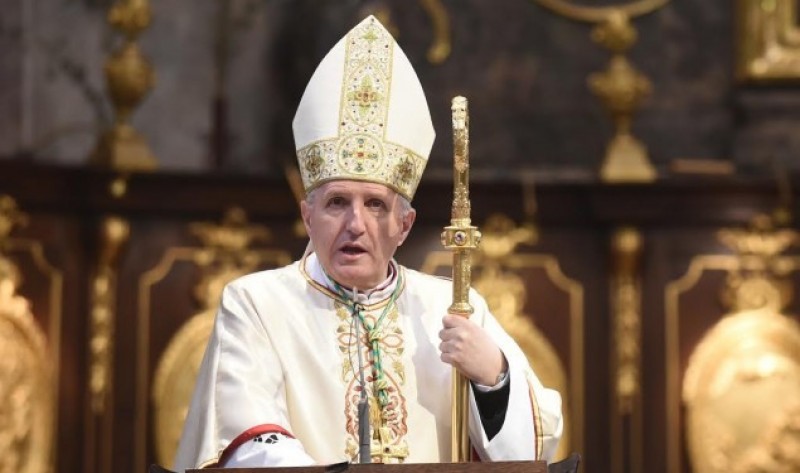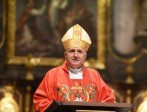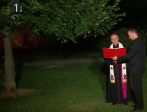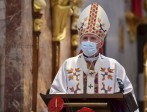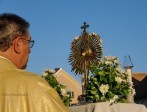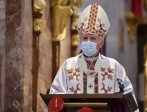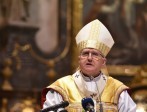Dear brothers and sisters. Last Sunday, we celebrated the most beautiful Mary's Feast - her Assumption, which opened our eyes to the realities that God has prepared for those who love him and moved our hearts to set our steps, our decisions - in short, our lives in this direction, the fulfilment in eternal life.
Today, however, the word of God speaks to us about the crisis. In today's understanding of this term, there is always something dangerous, something threatening. We are afraid of crises. We all remember the global economic and financial crisis of 2008, which shook the whole world and rocked it for many years. Now, we are still living in a global health crisis due to covid-19, which also affects the state of society - what we hear is happening in families who find it difficult to tolerate the situation dictated by measures to curb infections - and again in the economic field. We also talk about crisis periods in a person's life: the crisis of middle age, marriage crisis for married people, the crisis of the profession for priests and monks etc.
Because of such a connotation, there is something negative in our understanding of the crisis. Of course, it would be best if it did not exist at all. But if it occurs, we should be prepared to emerge out of it with as little damage as possible, as few negative consequences as possible, and above all, as soon as possible.
In Greek, which this word is derived from, however, crisis means something else. Krísis means'decision, separation', which is related to krī́nō 'cut off, separate, decide, judge'.
Therefore, we can rightly say that the word of God speaks to us about the crisis. The Israelites came to the Promised Land. Years of travelling through the desert are behind them. The generation that left Egypt under Moses and who remembered Egypt remained in the wilderness. A new generation came to the Promised Land. It knows the history of its people through the narration of the elders but has no personal experience. Even the glorious deeds by which God accompanied his people and saved them from the hands of their enemies are known only from the narration.
Therefore, the moment of decision came. "If you are not willing to serve him, decide today whom you will serve, the gods your ancestors worshiped in Mesopotamia or the gods of the Amorites, in whose land you are now living." There are three options to choose from: gods who fathers beyond the river served them are gods before the time of Abraham, for Abraham already knew the personal God, heard his voice, and was obedient to him, and was also a partaker of the fulfilment of his promises. Another possibility is the gods of the Amorites, in whose land they came. That is, they merge with the religion and culture of the environment. In itself, the question arises as to whether this land would remain a promised land to them, if they would renounce their God, for this God, Yahweh, the "one who is" promised them this land and led them into it. The third option, however, is to continue to serve the Lord.
The necessity of decision-making is astonishingly relevant even today, in the time and society we live in. There indeed is less of a tendency to return to the gods that our ancestors were supposed to serve. In addition to scholars, they are dealt with only by a group of enthusiasts, for whom one does not know whether it is a personal belief or merely an opposition to the Catholic faith and the Church. Even among the Israelites who came to Canaan, there was probably no particular interest in the gods feared and worshipped by Abraham's ancestors. So I understand Joshua's offer rather as a question: do they want to go back in time, to a time before they got their identity and became a nation according to God's law? In the time before, God chose them for his people.
A much greater danger is the constant possibility of cultural and religious fusion with the environment. Staying true to yourself, to your people, to your God and your faith, to your holidays, to your customs, to your ancestors has always been an effort to be different. Whoever remained true to himself was exposed. His otherness disturbed his surroundings. We have innumerable evidence for this, from the first martyr of St. Stephen and the burning of churches and the murders of priests in our time. And everything in between. Also in Slovenia, in our environment and our history. Today, endangering life is less common, but the "gods" of our time use other ways that threaten the otherness of a person who says that there are men and women in the world, the otherness of a person for whom marriage and family are something sacred, the otherness of a person who lives from the national tradition and nurtures it, as well as the otherness of Christians and believers of other faiths.
Whoever is different in this sense, is branded by the environment as intolerant, homophobic, their thoughts and ideals are labelled as hate speech and thus disqualified, and they the person is put in a pigeon-hole of the category the environment has formed to disable those who think differently and want to live differently. The environment attaches to them one of many - isms, which devalue the other, their thoughts and values and their view of the world. Without providing evidence, justification, without rational effort - just by slogans and shouting in the streets and the media.
When Joshua revealed to the people the urgency of the decision, he also said that he and his"family will serve the Lord." In this moment of the decision, the tribes of Israel also began to remember the Lord's presence in the lives of their fathers and their own. In this remembrance, they realized that God was in their favour to guide and protect them. With Joshua's decision and memory of their past, they decided, "So we also will serve the Lord; he is our God!"
However, the irrefutable truth remains that every Christian generation must re-opt for Christianity and thus for God, as Pope St. John Paul II told us when visiting Slovenia. The community of the twelve disciples of Jesus was also faced with this challenge after his Eucharistic speech at Capernaum.
"This teaching is too hard. Who can listen to it?" the disciples asked. But, of course, the hardness of this word does not refer so much to the word itself, although the statement of Jesus must have sounded very strange in the ears of a devout Jew, "I am the living bread that came down from heaven. If you eat this bread, you will live forever. The bread that I will give you is my flesh, which I give so that the world may live." The hardness or complexity of the word is shown when it is necessary to hear it and live from it. Even when the Father on the mountain revealed his Son and said to the three disciples, "Listen to him!" it was not a matter of listening to the words but shaping life according to those words. It is just a differently shaped invitation from Jesus: "Follow me!"
By leaving, the disciples implied that the word was too hard. "Because of this, many of Jesus' followers turned back and would not go with him anymore." But Jesus' conduct is surprising. He does nothing to keep them. He does not soften his word. He does not begin to adjust it to the mood of the listeners. He does not take back any of his claims, as we say. "The words I have spoken to you bring God's life-giving Spirit." I have no other words, for I have not come to amuse you with my words, but I have come for you to have life and to have it in abundance. If you cannot accept these words, you cannot enter life.
Not only did Jesus not hold anyone back. He seems to be worried that someone who is not ready to accept this word would stay with him; he is not prepared to accept Jesus as he is. So his question to the twelve, "Would you also like to leave?" There is no disappointment or reproach in this question. Everyone is entirely free. No one is forced to follow him. No one is forced to share his fate with him - even the suffering and death. However, whoever chooses to follow Him must follow Him.
Where are we today, dear brothers and sisters: do we follow him, or are we just named after him? Are we his enough to feel the consequences of ridicule and exclusion from those around us, or are we adapting enough to keep our consciences calm and our lives without trials? Do we live from his words because we are firmly convinced and know that he is Holy of God and has the words of eternal life?
Brothers and sisters, may this Sunday connect us to Christ. And may the blessing of Almighty God the Father and the Son and the Holy Spirit be with you. Amen.
Msgr Stanislav Zore
Metropolitan Archbishop of Ljubljana

